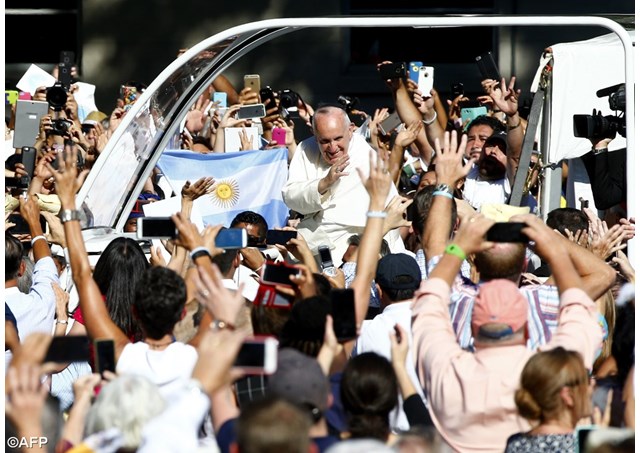
Pope's first full day in US

(Vatican Radio) Pope Francis has completed the first full day of his Apostolic visit to the United States, in the nation’s capital, Washington, DC. The schedule of the Holy Father’s public engagements for Wednesday included the official welcome ceremony on the south lawn of the White House, a meeting with the Catholic bishops of the United States in St. Matthew’s cathedral, and Mass at the Basilica of the National Shrine of the Immaculate Conception, on the campus of the Catholic University of America.
Listen to Chris Altieri's report from the United States
Three different occasions, with three very different audiences, and three vastly different central points of focus: how did Pope Francis manage to tie them all together and stay “on message” while doing justice to the particular nature and peculiar scope of each? The short answer to that very complex and multifaceted question is that he remembered his training in Jesuit religious life and drew on the great Catholic tradition of communication, which speaks at once to those inside the Church (ad intra), and those outside the Church’s visible boundaries (ad extra).
If, in his address to the bishops, he warned that, “Harsh and divisive language does not befit the tongue of a Pastor,” he also proved in his own body and with his own tongue – the body and the tongue of the universal Pastor of the Universal Church – that ‘harsh and divisive’ is not synonymous with, ‘frank and fearless’, especially when, at the White House, he reiterated his intention, “[T]o celebrate and support the institutions of marriage and the family at this, a critical moment in the history of our civilization,” and made his own, the US bishops’ clarion call to rally in defense of religious freedom. “[A]ll are called to be vigilant,” he said, “precisely as good citizens, to preserve and defend that freedom from everything that would threaten or compromise it,” for religious freedom, “remains one of America’s most precious possessions.”
At the same time, “American Catholics are committed to building a society which is truly tolerant and inclusive, to safeguarding the rights of individuals and communities, and to rejecting every form of unjust discrimination,” and our legitimate concern in this regard cannot keep us from working concretely toward adequate and equitable solutions to real problems that press upon us with increasing urgency – problems like those created by years and decades of failure to care for the created order over which God has set us as stewards.
We have said since before this visit began, that Pope Francis’ purpose in coming is to engage and encourage, to listen and to challenge – and yes – in both the etymological and the colloquial sense, to provoke everyone. What we saw on Wednesday in Washington, DC, was a Pastor at work – and the work he was about was the work of exploding the binary thought patterns that dominate our contemporary culture: he captures and commands our careful attention and at the same time he unleashes our pent-up moral imagination; this son of Ignatius shows us that, in order to seek God in all things, we must be prepared to let God reveal Himself to us.
The example he held up for us and for the whole Church and all the world, was that of an 18th century Franciscan priest, who was both brilliant scholar and missionary adventurer: Junipero Serra, OFM, who founded the first nine of the great chain of 21 missions in California, from San Diego to San Francisco. “Father Serra had a motto which inspired his life and work,” recalled Pope Francis in his homily, “a saying by which helived his life: siempre adelante! Keep moving forward!” Pope Francis went on to say, “For [St. Junipero Serra], this was the way to continue experiencing the joy of the Gospel, to keep his heart from growing numb, from being anesthetized. He kept moving forward, because the Lord was waiting. He kept going, because his brothers and sisters were waiting. He kept going forward to the end of his life. Today, like him, may we be able to say: Forward! Let’s keep moving forward!” This forward progress is toward a definite goal, the achievement of which is assured to the Church, and it is a progress in continuity with the unbroken way that has been cut and forged by God’s holy ones throughout all time and into eternity. “We are indebted to a tradition,” said Pope Francis, “[to] a chain of witnesses who have made it possible for the good news of the Gospel to be, in every generation, both ‘good’ and ‘news’.”
Pope Francis has been shaking things up, as they say: so much so, that a leading English-language journal recently wondered with cheeky frankness, “Is the Pope Catholic?” On Wednesday, in Washington, DC, the public thinking, the advocacy and witness that Pope Francis conducted bore the mark of Catholicity in both its capital and lower-case acceptions.
What to expect on Thursday, when the Holy Father will again make history when he addresses a joint meeting of the US Congress before going on to bless the St. Patrick’s parish soup kitchen and meet with the needy who find refuge and sustenance there? More of the same: yesterday, today, and ever. Do not expect it to get old.
| All the contents on this site are copyrighted ©. |


